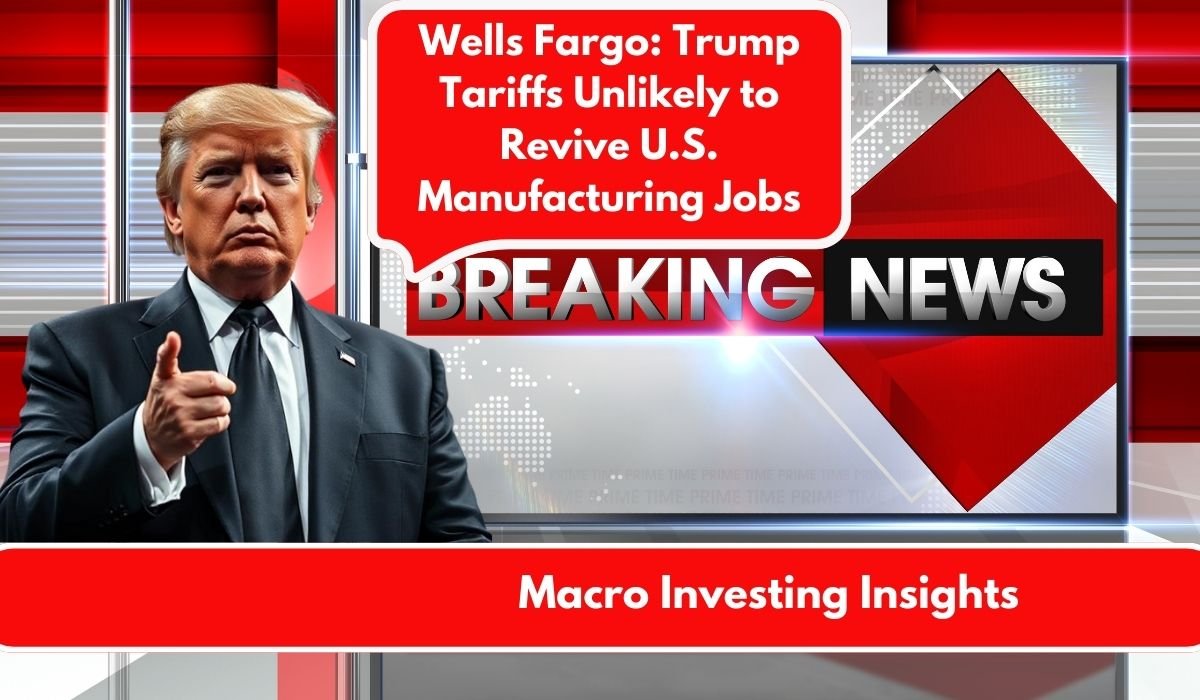Let’s be real—when you hear about “tariffs,” your eyes probably glaze over. But if you’re keeping up with investing, politics, or the job market, this is actually something worth understanding. So let’s break it down in a simple way.
Recently, Wells Fargo shared its thoughts on a pretty hot topic—Trump’s proposed tariffs and how they might (or might not) help U.S. manufacturing jobs bounce back. Spoiler alert: they think it’s unlikely that these tariffs will lead to a big revival of factory work in America.
What Are Trump’s Tariffs All About?
Tariffs are kind of like taxes on goods that come from other countries. The idea is, if imported stuff becomes more expensive, people and companies in the U.S. might start buying more American-made products. That sounds good in theory, right?
Well, that’s what former President Donald Trump pushed for during his time in office and even now as he talks about new tariffs if he’s re-elected. He says higher tariffs on imports could bring manufacturing jobs back to the U.S. by making American goods more competitive.
But it’s not that simple.
Wells Fargo’s Take: It’s Not That Easy
According to Wells Fargo’s investment analysts, putting tariffs on imported products might sound like a patriotic way to boost jobs, but in reality, it’s not likely to have the big impact that some people expect.
Why? Because a lot has changed over the years.
Manufacturing today isn’t what it used to be. It’s not just about having factories and workers—it’s also about having supply chains, advanced machines, cheap materials, and skilled labor. And honestly, a lot of that is now based overseas.
So even if you slap tariffs on goods from China or Mexico, American companies might still struggle to make those same products at home without increasing prices or lowering quality.
The Jobs Just Aren’t Coming Back That Fast
One of the big promises behind tariffs is the return of “Made in America” jobs. But Wells Fargo says that’s not really how it’s playing out.
Even during Trump’s first term, after introducing a bunch of tariffs, the U.S. didn’t see a massive boom in manufacturing jobs. In fact, job growth in that sector stayed pretty flat. Some companies even cut jobs due to higher production costs.
Here’s the thing—automation (think robots and smart machines) is also taking over a lot of factory jobs. So even if factories return to the U.S., they won’t need as many human workers as before.
Tariffs Can Backfire Too
Another thing to think about—tariffs can cause problems for businesses that rely on foreign materials or parts. Imagine a U.S. company that makes washing machines but buys its steel from overseas. If that steel gets hit with a tariff, the company’s costs go up. They might raise prices, or worse, lay off workers to save money.
So instead of helping the job market, tariffs can sometimes do the opposite. That’s why Wells Fargo is urging investors and policymakers to look at the big picture—not just the short-term politics.
What It Means for Investors
If you’re into investing, especially in manufacturing stocks or macroeconomic trends, this matters to you.
Wells Fargo is basically saying: don’t expect a sudden boom in American manufacturing just because of some new tariffs. Instead, look at longer-term strategies like tech innovation, training programs for workers, and reshaping global supply chains. That’s where the real opportunities lie.
So if you’re building a portfolio, it might be smarter to focus on companies that adapt well to change rather than ones betting on tariff-driven job growth.
Conclusion
In short, while the idea of bringing back American manufacturing through tariffs sounds patriotic and powerful, the reality is a bit more complicated. According to Wells Fargo, these trade barriers aren’t likely to spark the job boom some people hope for. The world of manufacturing has moved on—it’s global, high-tech, and constantly changing. If we really want to rebuild that industry, it’s going to take more than just tariffs.
FAQs
Do tariffs really create jobs?
Not always. They can help some industries but often raise costs for others, leading to job losses too.
Why are manufacturing jobs not coming back?
Global supply chains, automation, and high costs make it tough to bring these jobs back.
What’s Wells Fargo’s main point?
They believe tariffs won’t be enough to revive U.S. manufacturing in a big way.
How do tariffs affect the economy?
They can increase prices, hurt some businesses, and change trade relationships with other countries.
Should I invest in U.S. manufacturing stocks now?
Be cautious. Focus on companies that adapt to global changes rather than relying only on tariffs for growth.





